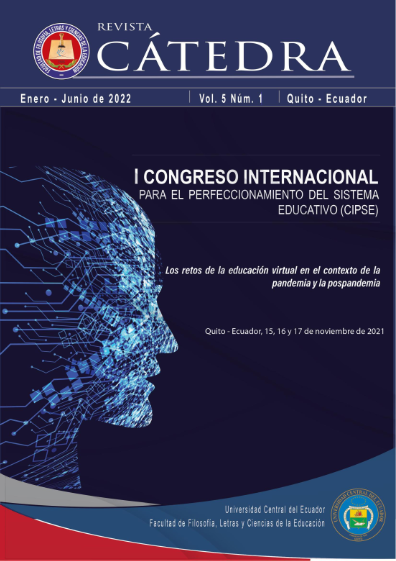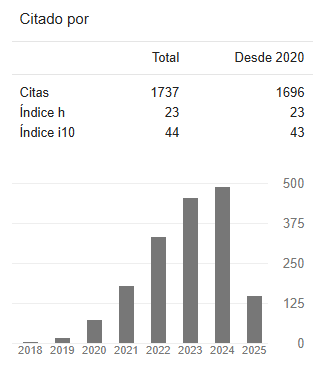Relational analysis of the graduation profile of the unified general baccalaureate and the academic offer of the Pedagogy in Experimental Sciences and Computer Science degree program
DOI:
https://doi.org/10.29166/catedra.v5i1.3428Keywords:
unified general baccalaureate, computer science, academic offerings, entrance profileAbstract
In the course of high school, Ecuadorian students take the exam Ser bachiller, a component that allows access to higher education, that is why this research focused on knowing the factors that affect the relationship of the graduation profile of the students of the Unified General Baccalaureate for the entrance to the Pedagogy Career in Experimental Sciences of Computer Science of the Faculty of Philosophy, Letters and Educational Sciences at the Central University of Ecuador. Non-experimental research was carried out, with a field approach, at a descriptive level, using quantitative methodology, data was collected; in addition, a test was conducted, which worked with the students entering the career as essential informants and data was processed using SPSS 23 statistical software. Among the main findings, it was evidenced that the students graduated under the BGU program of study evidence certain deficiencies before the demands of the entrance profile required by the Central University of Ecuador, also that the skills and abilities acquired by the BGU students are elementary, and the expectations that the students reach the level of excellent achievement is scarce; decreasing the possibilities of entering higher education.
Downloads
References
Instituto de Evaluación Educativa. (2019). Informe de resultados nacional. http://www.evaluacion.gob.ec/evaluaciones/investigaciones-ser-bachiller/.
Ministerio de Educación del Ecuador. (0 de 0 de 2019). Currículo de los niveles de educación obligatoria. Recuperado el 21 de 3 de 2021, de Ministerio de Educación Currículo: https://educacion.gob.ec/curriculo/.
Santana, C. I. (04 de 01 de 2016). La reforma del Bachillerato en el Ecuador entre 2007-2014: caso de la Unidad Educativa Fiscal 13 de octubre de Calceta-Manabí. Recuperado el 24 de 06 de 2019.
Ortiz Herrera, J. D., Buitron Aguas, L. H., & Yupangui Carrillo, Y. de las M. (2017). Nivelación propuesta por la SENESCYT: Vivencias en la Universidad Central del Ecuador. INNOVA Research Journal, 2(10.1), 42-53. https://doi.org/10.33890/innova.v2.n10.1.2017.491
Bachillerato General Unificado. (s. f.). Ministerio de Educación. Recuperado 10 de febrero de 2021, de https://educacion.gob.ec/bachillerato-general-unificado/
Instituto Nacional de Evaluación Educativa. (10 de 06 de 2013). Resultados Educativos INEVAL. Recuperado el 22 de 03 de 2020, de https://www.evaluacion.gob.ec/ineval-presento-resultados-educativos-2/
Reglamento general a la ley orgánica de educación intercultural, 116 (2012). https://educacion.gob.ec/wp-content/uploads/downloads/2017/02/Reglamento-General-a-la-Ley-OrgAnica-de-Educacion-Intercultural.pdf
Santana Cobo, M. C. (2015). Análisis de las fallas de implementación de la política de educación para bachillerato en Ecuador, a partir de la reforma educativa de 2011 [Facultad Latinoamericana de Ciencias Sociales-Flacso Ecuador]. http://hdl.handle.net/10469/13597
Madrid-Tamayo, T. (2019). El sistema educativo de Ecuador: un sistema, dos mundos. Revista Andina de Educación, 2(1), 8–17. https://doi.org/10.32719/26312816.2019.2.1.2
Rosero, M. (2020, enero 26). Lorena Araujo: ‘La “U” debe reflexionar sobre qué necesita el país’ | El Comercio. El Comercio, 2. https://www.elcomercio.com/actualidad/lorena-araujo-universidad-educacion-bachiller.html.









